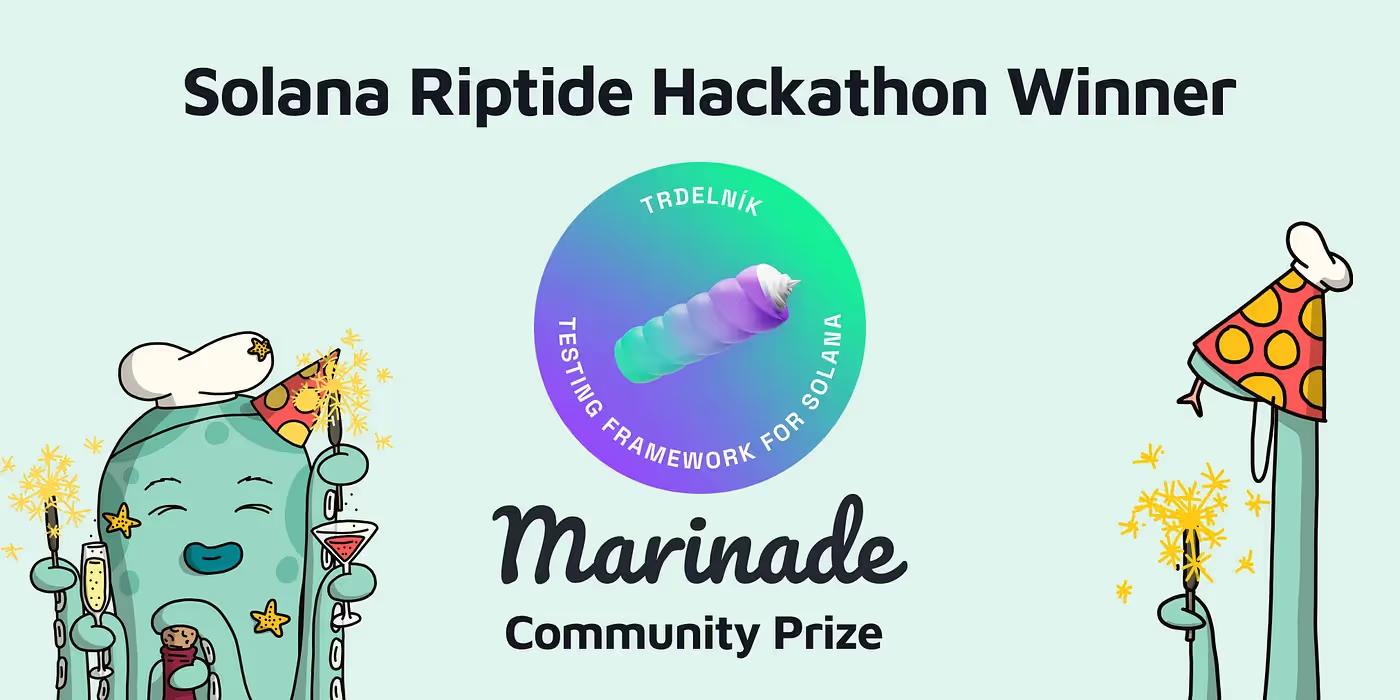Meet Trdelník, the winning product of the Marinade grant for the Riptide Hackathon!
Hackathons are near and dear to the Marinade Chefs. As you may remember, Marinade itself was born out of the Solana x Serum DeFi Hackathon in March, 2021. So it was an honor to sponsor a prize and judge the 2022 Solana Riptide Hackathon.

Hackathons are near and dear to the Marinade Chefs. As you may remember, Marinade itself was born out of the Solana x Serum DeFi Hackathon in March, 2021. So it was an honor to sponsor a prize and judge the 2022 Solana Riptide Hackathon.
Between February 2nd and March 17th, the Riptide Hackathon organized by Solana Labs took place, presenting a chance for builders to display their next product and win awards in different categories.
This year, the available tracks were Payments, DeFi, Web3, Gaming and DAOs. Each of those tracks would reward the top 5 projects with a grant and exposure to the whole Solana community.
Riptide featured more than 550 projects submitted and over 7,000 participants! This success shows the ever-increasing interest in building on Solana, which is settling as a vibrant and innovative ecosystem for builders of all horizons. You can discover the complete list of winners for each track at this link.
In addition to the top categories (Payments, DeFi, Web3, Gaming and DAOs), a large number of protocols (see the full list here) added to the pot with Sponsored prizes for integrations. Marinade was among them with a $30k prize to distribute for the best integration. After the Chefs had selected the from the most promising project integrating with Marinade, an internal vote took place to determine the winning submission, and the choice of the Chefs landed on Trdelník, a testing framework for Rust developers. This product is designed by Ackee Blockchain, an audit company that provides security assessments on both Solana and Ethereum.
It’s time to introduce Trdelník and what it will have to offer Marinade and Solana at large!
Ackee Blockchain introduction
We had the chance to meet with Josef, co-founder of Ackee Blockchain and Assistant Professor at the University of Prague after obtaining his Doctorate in Distributed Systems.
He explained to us that everything started with Ackee, a software development company he co-founded in 2012, focused on mobile app developments. After working for three years on this company, Josef discovered blockchain and dove into Distributed Systems. This led Ackee to start exploring the blockchain ecosystem and in 2018, work on developers tooling for Ethereum, for which they obtained a grant by the Ethereum Foundation. During the same year, Ackee was introducing their product at DevCon.
In 2021, another big step for Ackee was the decision to split the company and create Ackee Blockchain, a joint venture with Rockaway Blockchain Fund aiming at offering audit services to blockchain protocols. With their experience on ETH, they also decided to approach Solana, an innovative blockchain that yet had lots to do in terms of audits and tooling. Ackee Blockchain was created with two different teams, one working on Ethereum while the other would tackle Solana.
Their interest in Solana was born out of their love for Rust programming language, which they consider a proof of seriousness and a desire to have a solid architecture. They also enjoyed the overall architecture of the Solana blockchain, offering a path to a decentralized blockchain that stays efficient and performant.
“The path that the Solana ecosystem is taking, with a vibrant and active community and more and more projects appearing, is creating a bigger and bigger need for developers tooling and testing frameworks to be available.” — Josef , Ackee Blockchain
After its creation, Ackee Blockchain quickly started auditing some of the biggest ecosystem players, like 1INCH, LayerZero, TraderJoe, NeonLabs, but also Marinade!
In the last month only, they found three critical issues in protocols they were auditing that prevented real hacking risks.
With the objective of staying a small but experienced and professional company with a high level of expertise, they are on the path of creating an audit framework for projects that don’t have sufficient test coverages.
With 80% of ETH protocols having tests coverage compared to 20% for Solana (as there is no tooling allowing to do so easily), they identified a real issue to fix for developers working with Rust in the Solana ecosystem.
From this idea was born Trdelnik, a testing framework for Solana with a name inspired by the famous testing framework Brownie on ETH. For them, it only seemed logical that the testing framework for Solana should also be named after a delicious pastry, so they chose Trdelnik, a Czech specialty!

Trdelník, a testing framework with multiple tools to offer
The goal of Trdelník is to solve a real issue in the Solana ecosystem: lack of testing.
In order to build this, a part of their revenues obtained through the audits they realize is redirected to funding the Trdelník product, and Ackee Blockchain also works in partnership with the Czech Technical University in Prague to offer an interesting experience in the Solana ecosystem. The goal is to publish an academic white paper about Trdelnik, as Josef sees here a potential to onboard other researchers in distributed systems and compilers to Solana.
They saw the Riptide Hackathon as a way to put light on the fundamental product they are trying to build, and Marinade is pleased to be supporting fundamental blocks of the ecosystem that will be useful to everyone in the future.
Because Trdelník will be an open-source project, it is free to be used by any protocol with the unique goal of making the Solana ecosystem mature and improve. Their goal is to launch a MVP in June, accessible to everyone, which will first contain the Trdelník client. The Trdelník client will allow you to quickly create test environments for your program, run transactions and observe their outputs without having to create the tests all by yourself.
In the future, they want to build a local explorer for local deployment, allowing to test some hypothesis that are currently very hard to reproduce in a local environment, before being able to work on a debugger and a dev-console.
For Josef, “Testing is a crucial part of every software product” and this sentence has been true since the beginning of Internet and will be in web3.
But as Solana progresses so quickly, a lot of developers don’t have time to write extensive tests. This is the primary reason that made them tackle this issue with full force, as they believe it’s time to fill this gap for the ecosystem to mature.
Their goal is to “make the life of Solana developers easier, by providing tooling that allow extensive testing without harming the speed at which they build.”
If you are building on Solana, make sure to join the Ackee Blockchain Discord and stay tuned for their announcements, as Trdelník should arrive soon to make your life easier! Their MVP release is planned for June, 26 at 18:30 CEST, during the Barcelona Hacker House.
Marinade eagerly awaits seeing this product emerge and improve, and hopes that the Riptide grant will enable Ackee Blockchain to build even more in the coming months.
About Marinade
Marinade.Finance is the first non-custodial liquid staking protocol built on Solana. Stake your SOL tokens with Marinade and receive mSOL (“marinated SOL”) tokens in return that can be used in decentralized finance (DeFi). mSOL is the most widely integrated collateralized version of SOL. The price of mSOL goes up relative to SOL each epoch, with rewards being accrued into your stake account.
Marinade’s delegation strategy stakes to 400+ validators that are selected automatically by an open-source, fair formula based on performance, commission, and decentralization.
Marinade includes mSOL->SOL swap, so you can “Unstake Now” and receive your SOL immediately for a small fee. You can also directly exchange between mSOL and SOL on secondary markets at the current rate. Finally, you can unstake your SOL with zero fee by waiting 2–3 days for the Solana cool-down period (Delayed Unstake).


